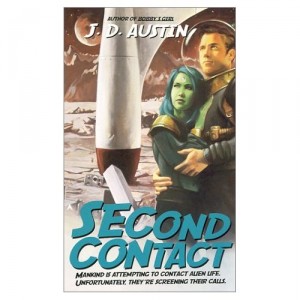 Welcome to the year 2039. Earth’s a nice place to be. A little more advanced, a little wiser, a little more civilized. Their first starship, the GSS Lifespring, is about to make a historic first contact with the distant planet, Kilvan. It’s a mission of peace, the open hand of friendship, and a chance to build a bridge of diplomatic relationships between the two races. For Kilvan is a lovely, peaceful planet, whose name means “tranquil” in a long-dead language. As far as anyone can tell, there’s no reason to expect anything other than a warm welcome. That’s why it comes as quite a surprise when Kilvan fires several missiles across the Lifespring’s bow and politely asks them to leave.
Welcome to the year 2039. Earth’s a nice place to be. A little more advanced, a little wiser, a little more civilized. Their first starship, the GSS Lifespring, is about to make a historic first contact with the distant planet, Kilvan. It’s a mission of peace, the open hand of friendship, and a chance to build a bridge of diplomatic relationships between the two races. For Kilvan is a lovely, peaceful planet, whose name means “tranquil” in a long-dead language. As far as anyone can tell, there’s no reason to expect anything other than a warm welcome. That’s why it comes as quite a surprise when Kilvan fires several missiles across the Lifespring’s bow and politely asks them to leave.
In true Earth style, our response is to leave for the moment. But, now that we’ve made contact with another race, a potentially hostile one, we can’t let the matter rest. It’s to that end that the USS Forlorn Hope and its brave crew are sent back to give peace a second chance … and if that fails, nuke Kilvan before they can come after us. But appearances aren’t what they seem. Kilvan’s a genuinely friendly world, a world of leisure, centuries ahead of us in technology but equally advanced in a pursuit of creature comforts. It’s not their fault they’re having a bad year, attitude-wise. It’s just something in the atmosphere. The only problem is, the arrival of the Forlorn Hope is about to coincide with the worst day Kilvan’s had in three hundred years….
In Second Contact, J.D. Austin (a psudonym for Joshua Dann, better known for his popular Timeshare trilogy) takes all of the old “First Contact” cliches, stabs them in the back, and shoves them into a dark closet, and locks the door securely afterwards. This book, pointedly tongue-in-cheek, possesses a certain wry humor that pokes fun at all the grim and solemn conventions of making contact with alien races, delivering its observations through the eyes of humans and Kilvans alike in a manner calculated to coax a laugh from the reader when they least expect it. It’s not a serious book, but one rich in characterization and filled with a certain warmth, making it a pleasant, albeit quick, read. Kilvan comes off not so much as an alien environment as it does a world modeled after the best beach resorts and Parisien cafes, with advanced technology thrown in for good measure. So if you’re in the mood for an easy, somewhat amusing read to kill the afternoon or cleanse the palate between sprawling space operas and scientifically-accurate explorations of Mars, this is the book for you.
